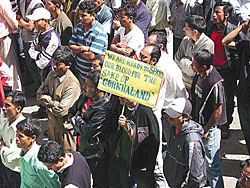 DAMBER K SHRESTHA |
This time, the movement has been kept generally non-violent but the fear of violence remains. Supporting the Bharatiya Janata Party (BJP) and choosing former Minister Jaswant Singh as the candidate for the forthcoming federal elections in India has become a hotly debated move.
People are asking whether a district that is nearly 20 per cent Christian should vote for a party that blatantly talks of creating a Hindu nation and has a poor record of accepting other minorities, especially after the attack on Christians in Orissa and Karnataka.
People are also asking that if it's about Nepali identity, why not field a Nepali candidate? There is further speculation and rumour about whether the former Nepali King actually brokered the deal with the BJP. As the 13th and last King of the Gorkha dynasty, he may be the only person set on keeping the Gorkha identity alive.
While Nepal's identity war has fostered breaking away from the Gorkha badge, it is very strange to see Nepalis in India eager to be associated with a brand that has been banished from Nepal.
Identity is all about your brand, be it a Gujarati or a Jew identified as a merchant or banker, a Keralite women identified with nursing and office administration, the youth from Karnataka identified with IT or a Philipino identified with music. Do Nepalis really want to be identified as the brave Gorkha solider fighting guns with a Khukuri knife when wars today are fought with the help of satellite guided missiles and sophisticated technology driven weapons?
When the Indian administration asked those demanding a Gorkhaland about their plans for economic growth were the area given a state, the answers were never articulated. This is reminiscent of the way the government of Nepal is unable to figure out its economic agenda when it meets the donor community. We need to move from asking who we are to asking what we can do. The millions of Nepalis in India cannot just hang their fate based on what will happen to the demand for a separate state. It's more important for them to be integrated in the economic growth of India and carve out the identity of Nepalis in India. Perhaps having a separate state will give them direct control over resources but they need to build competencies and capacities too. Otherwise, the opportunity would be squandered in the same way that Gorkhaland leader Subhas Ghishing, played for 20 years on the hopes and aspirations of Nepalis in India.



